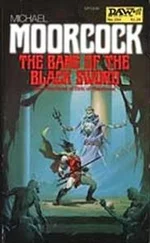Michael Moorcock - The Dreamthief's Daughter
Здесь есть возможность читать онлайн «Michael Moorcock - The Dreamthief's Daughter» весь текст электронной книги совершенно бесплатно (целиком полную версию без сокращений). В некоторых случаях можно слушать аудио, скачать через торрент в формате fb2 и присутствует краткое содержание. Жанр: Фэнтези, на английском языке. Описание произведения, (предисловие) а так же отзывы посетителей доступны на портале библиотеки ЛибКат.
- Название:The Dreamthief's Daughter
- Автор:
- Жанр:
- Год:неизвестен
- ISBN:нет данных
- Рейтинг книги:4 / 5. Голосов: 1
-
Избранное:Добавить в избранное
- Отзывы:
-
Ваша оценка:
- 80
- 1
- 2
- 3
- 4
- 5
The Dreamthief's Daughter: краткое содержание, описание и аннотация
Предлагаем к чтению аннотацию, описание, краткое содержание или предисловие (зависит от того, что написал сам автор книги «The Dreamthief's Daughter»). Если вы не нашли необходимую информацию о книге — напишите в комментариях, мы постараемся отыскать её.
The Dreamthief's Daughter — читать онлайн бесплатно полную книгу (весь текст) целиком
Ниже представлен текст книги, разбитый по страницам. Система сохранения места последней прочитанной страницы, позволяет с удобством читать онлайн бесплатно книгу «The Dreamthief's Daughter», без необходимости каждый раз заново искать на чём Вы остановились. Поставьте закладку, и сможете в любой момент перейти на страницу, на которой закончили чтение.
Интервал:
Закладка:
Hitler's opponents were already in his power, thanks to the authority of the State he had seized. We could all see this, those of us who were horrified, but it was impossible to convince anyone. So many German people so badly needed stability they were willing to cleave to the Nazis. And it was easier to forget a Jewish neighbor's disappearance than it was the concerns of your own relatives.
And so ordinary people were led into complicity in that evil, through deed or word or that awful silence, to become part of it, to defend against their own consciences, to hate themselves as well as others, to choose a strutting self-esteem over self-respect, and so devalue themselves as citizens.
In this way a modern dictatorship makes us rule ourselves on its behalf. We learn to gloss our self-disgust with cheap rhetoric, sentimental talk, claims of good will, protestations of innocence, of victimhood. And those of us who refuse are ultimately killed.
For all my determination to pursue the cause of peace, I still maintained my swordsmanship. It had become much more than a mere pasatiempo. It remained something of a cause, I suppose, a method of controlling what little there was still in my own control. The skills needed to wield the Raven Blade were highly specialized, for while my sword was balanced so perfectly I could easily spin it in one hand, it was of heavy, flexible steel and had a life of its own. It seemed to flow through my hands, even as I practiced.
The blade was impossible to sharpen with ordinary stone. Von Asch had given me a special grindstone, which appeared to be imbedded with pieces of diamond. Not that the blade ever needed much sharpening.
Freudians, who were busily interpreting our chaos in those days, would have known what to think of my tendency to bond with my blade and my unwillingness to be separated from it. Yet I felt I drew power from the weapon. Not the kind of brute, predatory power the Nazis so loved, but a permanent sustenance.
I carried the sword with me whenever I traveled, which was rarely. A local maker had fashioned a long gun case, into which Ravenbrand fitted discreetly, so that to the casual eye, with the case over my shoulder, I looked like some bucolic landsman prepared for a day's shooting or even fishing.
I had it in my mind that whatever happened to Bek, the sword and I would survive. Whatever the symbolic meaning of the sword was, I cannot tell you, save that it had been handled by my family for at least a thousand years, that it was said to have been forged for Wotan, had turned the tide at Roncesvalles, leading the monstrous horses of Carolinian chivalry against the invading Berber, had defended the Danish royal line at Hastings and served the Saxon cause in exile in Byzantium and beyond.
I suppose I was also superstitious, if not completely crazy, because I sensed there was a bond between myself and the sword. Something more than tradition or romance.
Meanwhile the quality of civil life continued to decline in Germany.
Even the town of Bek with her dreaming gables, twisted old roofs and chimneys, green-glazed windows, weekly markets and ancient customs, was not immune to the twentieth-century jackboot.
In the years before 1933, a small division of self-titled Freikorps, made up mostly of unemployed ex-soldiers commanded by NCOs who had given themselves the rank of captain or higher, paraded occasionally through the streets. They were not based in Bek, where I refused to allow any such goings-on, but in a neighboring city. They had too many rivals in the city to contend with, I suspect, and felt more important showing their strength to a town of old people and children, which had lost most of its men.
These private armies controlled parts of Germany and were constantly in conflict with rivals, with communist groups and politicians who sought to curb their power, warning that civil war was inevitable if the Freikorps were not brought under control. Of course, this is what the Nazis offered to do-to control the very forces they were using to sow the seeds of further uncertainty about the future of our poor, humiliated Germany.
I share the view that if the allies had been more generous and not attempted to suck the last marrow from our bones, Hitler and the Freikorps would have had nothing to complain of. But our situation was manifestly unjust and in such a climate even the most moderate of burghers can somehow find himself condoning the actions of people he would have condemned out of hand before the War.
Thus, in 1933, fearing Russian-style civil conflict worse than tyranny, many of us voted for a "strong man," in the hope it would bring us stability.
Sadly, of course, like most "strong men," Hitler was merely a political construct, no more the man of iron his followers declared him to be than any other of his wretched, ranting psychopathic type.
There were a thousand Hitlers in the streets of Germany, a thousand dispossessed, twitching, feckless neurotics, eaten up with jealousy and frustrated hatred. But Hitler worked hard at his gift for cheap political oratory, drew power from the worst elements of the mob, and spoke in the grossest emotional terms of our betrayal not, as some perceived it, by the greed of our leaders and the rapacity of our conquerors, but by a mysterious, almost supernatural, force they called "International Jewry."
Normally such blatant nonsense would have gathered together only the marginal and less intelligent members of society, but as financial crisis followed crisis, Hitler and his followers had persuaded more and more ordinary Germans and business leaders that fascism was the only way to salvation.
Look at Mussolini in Italy. He had saved his nation, regenerated it, made people fear it again. He had masculinized Italy, they said. Made it virile as Germany could be made virile again. It is how they think, these people. Guns and boots, flags and prongs I Blacks and whites. Rights and wrongs... As Wheldrake put it in one of those angry doggerel pieces he wrote just before his death in 1927.
Simple pursuits. Simple answers. Simple truths.
Intellect, learning and moral decency were mocked and attacked as though they were mortal enemies. Men asserted their own vulnerable masculinity by insisting, as they so often do, that women stay at home and have babies. For all their worship of these earth goddesses, women were actually treated with sentimental contempt. Women were kept from all real power.
We are slow to learn. Neither the English, French nor American experiments in social order by imposition came to any good, and the communist and fascist experiments, equally puritanical in their rhetoric, demonstrated the same fact-that ordinary human beings are far more complex than simple truth and simple truth is fine for argument and clarification, but it is not an instrument for government, which must represent complexity if it is to succeed. It was no surprise to many that juvenile delinquency reached epidemic proportions in Germany by 1940, although the Nazis, of course, could not admit the problem which was not supposed to exist in the world they had created.
By 1933, in spite of so many of us knowing what the Nazis were like, they had taken control of parliament. Our constitution was no more than a piece of paper, burning amongst great, inspired books, by Mann, Heine, Brecht, Zweig and Remarque, which the Nazis heaped in blazing pyres at crossroads and in town squares. An act they termed "cultural cleansing." It was the triumph of ignorance and bigotry.
Boots, blackjacks and whips became the instruments of political policy. We could not resist because we could not believe what had happened. We had relied upon our democratic institutions. We were in a state of national denial. The realities, however, were soon demonstrated to us.
It was intolerable for any who valued the old humane virtues of German life, but our protests were silenced in the most brutally efficient ways. Soon there were only a few of us who continued to resist.
Читать дальшеИнтервал:
Закладка:
Похожие книги на «The Dreamthief's Daughter»
Представляем Вашему вниманию похожие книги на «The Dreamthief's Daughter» списком для выбора. Мы отобрали схожую по названию и смыслу литературу в надежде предоставить читателям больше вариантов отыскать новые, интересные, ещё непрочитанные произведения.
Обсуждение, отзывы о книге «The Dreamthief's Daughter» и просто собственные мнения читателей. Оставьте ваши комментарии, напишите, что Вы думаете о произведении, его смысле или главных героях. Укажите что конкретно понравилось, а что нет, и почему Вы так считаете.








